Best Pet Birds For Beginners That Are Easy To Train

Table of Contents
The Ultimate Guide to Feathered Companionship.
Are you considering adding a vibrant, chirping companion to your home but feeling overwhelmed by the options? Many first-time birds owners mistakenly believe all birds require the same level of care, or worse, that birds are low-maintenance pets that can be left alone for days. The truth is far more nuanced.
If you are looking for the best pet birds for beginners in the United States, here is a guide that will help you navigate through the colorful world of avian companionship. Whether you live in a compact apartment, have a bustling family home, or simply want a feathered friend that won’t demand excessive attention, this comprehensive guide will help you find your perfect match.
Finding Your Perfect Feathered Friend: A Self-Assessment
Before diving into specific bird species, take a moment to honestly evaluate your lifestyle and expectations. Consider these questions:
- Time Commitment: How many hours daily can you dedicate to interacting with your bird?
- Noise Tolerance: Do you live in a noise-sensitive environment like an apartment?
- Budget: What’s your initial budget and monthly allowance for pet care?
- Household Dynamics: Do you have children or other pets?
- Space: How much room can you allocate for a cage and play area?
- Long-term Planning: Are you prepared for a pet that may live 10-30 years?
Answering these questions truthfully will guide you toward a bird species that complements your lifestyle rather than complicating it. Remember, bringing a bird home is a significant commitment—their well-being depends entirely on your consistent care and attention.
Best Pet Birds For Beginners: Apartment Dwellers
Living in an apartment doesn’t mean you can’t enjoy bird companionship. These species are particularly suitable for smaller living spaces due to their modest size and relatively quiet nature.
Budgies (Parakeets)
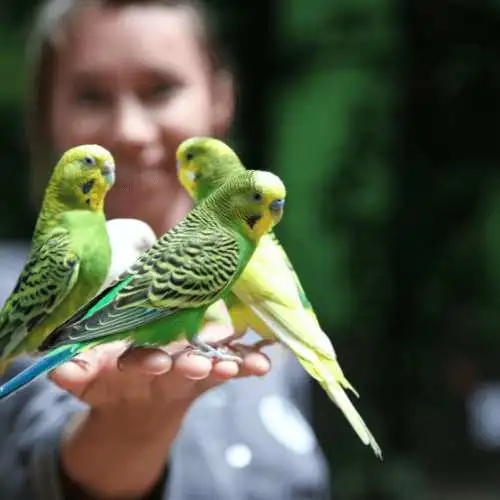
Overview: These small, colorful birds typically measure 7-8 inches and come in a rainbow of color variations. Native to Australia, they’ve become one of the most popular pet birds worldwide.
Temperament: Budgies are naturally social, curious, and playful. With consistent handling, they become remarkably tame and can even learn to mimic human speech.
Care Requirements:
- Cage size: Minimum 18″L x 18″W x 18″H
- Diet: High-quality seed mix, pellets, fresh vegetables, and fruits
- Enrichment: Toys, perches of varying diameters, mirrors, and regular out-of-cage time
Health Considerations: Watch for respiratory issues, mites, and obesity. Regular nail and beak maintenance may be necessary.
Lifespan: 5-10 years with proper care
Noise Level: Moderate chattering and chirping; generally not disruptive to neighbors
Cost: $20-$50 for the bird; $100-$200 for initial setup; $20-$30 monthly for food and supplies
Pros: Affordable, highly interactive, can learn tricks and words, don’t require enormous cages Cons: Can be noisy during active periods, need daily attention, may not be ideal for homes with cats
Finches (Zebra Finches, Society Finches)
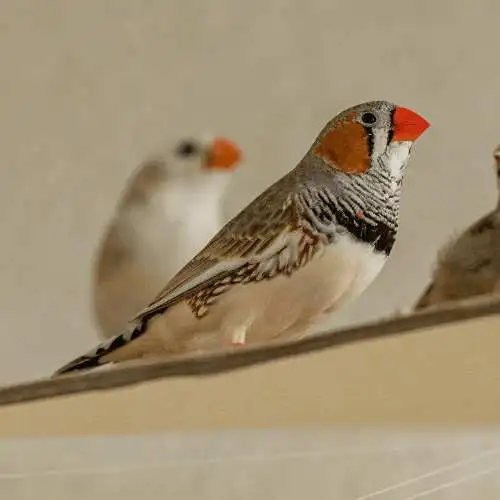
Overview: Tiny birds (4-6 inches) with beautiful markings and fascinating social behaviors. Zebra finches sport distinctive orange cheek patches and striped tails.
Temperament: Independent, social with other finches, and content to entertain themselves. They’re less hands-on than other birds.
Care Requirements:
- Cage size: Long rather than tall, at least 24″L x 16″W x 16″H
- Diet: Finch seed mix, millet sprays, and occasional greens
- Enrichment: Flying space, multiple perches, nesting material
Health Considerations: Susceptible to air sac mites and respiratory infections. Keep cages clean and away from drafts.
Lifespan: 5-9 years
Noise Level: Soft, pleasant chirping and tweeting; one of the quietest pet bird options
Cost: $10-$30 per bird (best kept in pairs); $100-$150 for setup; $15-$20 monthly maintenance
Pros: Low maintenance, quiet, entertaining to watch, don’t require handling Cons: Not cuddly or trainable, should be kept in pairs, not suitable for those wanting interactive pets
Canaries
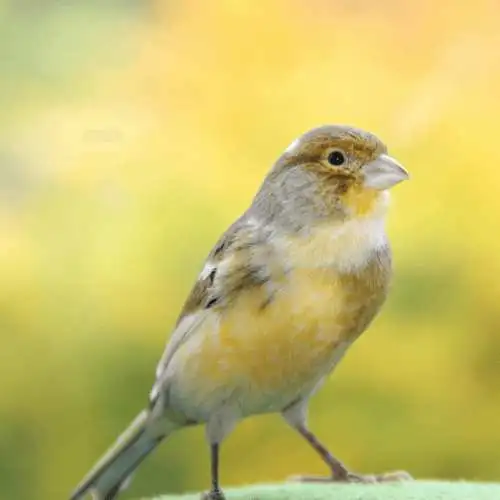
Overview: Medium-sized songbirds (5-8 inches) famous for their melodious singing, especially males. Available in various colors including yellow, red, and white.
Temperament: Independent and somewhat shy. They’re content to sing and flit about their cage without much human interaction.
Care Requirements:
- Cage size: At least 24″L x 16″W x 16″H with room to fly
- Diet: Canary seed mix, greens, and occasional egg food
- Enrichment: Various perches, swings, and bathing dishes
Health Considerations: Prone to respiratory issues and mites. Males may develop singing tumors.
Lifespan: 10-15 years
Noise Level: Males sing beautifully; the sound is pleasant and not too loud
Cost: $50-$150 depending on color and singing ability; $150 for setup; $20 monthly maintenance
Pros: Beautiful singing, low maintenance, long lifespan, don’t require handling Cons: Not interactive pets, can be flighty when startled, males may stop singing in stressful environments
Best Pet Birds for Families with Children
Birds that can adapt to busier households and tolerate (supervised) interaction with children make excellent family pets.
Cockatiels
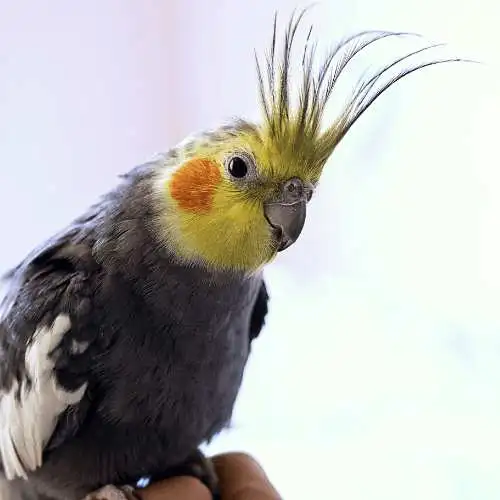
Overview: Medium-sized birds (12-14 inches including tail) with distinctive yellow faces and crests. Originally from Australia, they’re known for their whistling abilities.
Temperament: Gentle, affectionate, and capable of forming strong bonds with family members. They’re generally patient with careful handling.
Care Requirements:
- Cage size: Minimum 24″L x 24″W x 24″H
- Diet: Cockatiel seed mix, high-quality pellets, fresh vegetables and fruits
- Enrichment: Climbing toys, swings, puzzles, regular supervised out-of-cage time
Health Considerations: Susceptible to respiratory issues, fatty liver disease, and calcium deficiencies.
Lifespan: 15-20 years
Noise Level: Moderate whistling and chirping; can learn simple tunes but aren’t overly noisy
Cost: $80-$150 for the bird; $200-$300 for setup; $30-$40 monthly maintenance
Pros: Affectionate, interactive, can learn tricks and whistles, good for families Cons: Longer commitment due to lifespan, can be dusty (not ideal for allergy sufferers), need daily interaction
Lovebirds
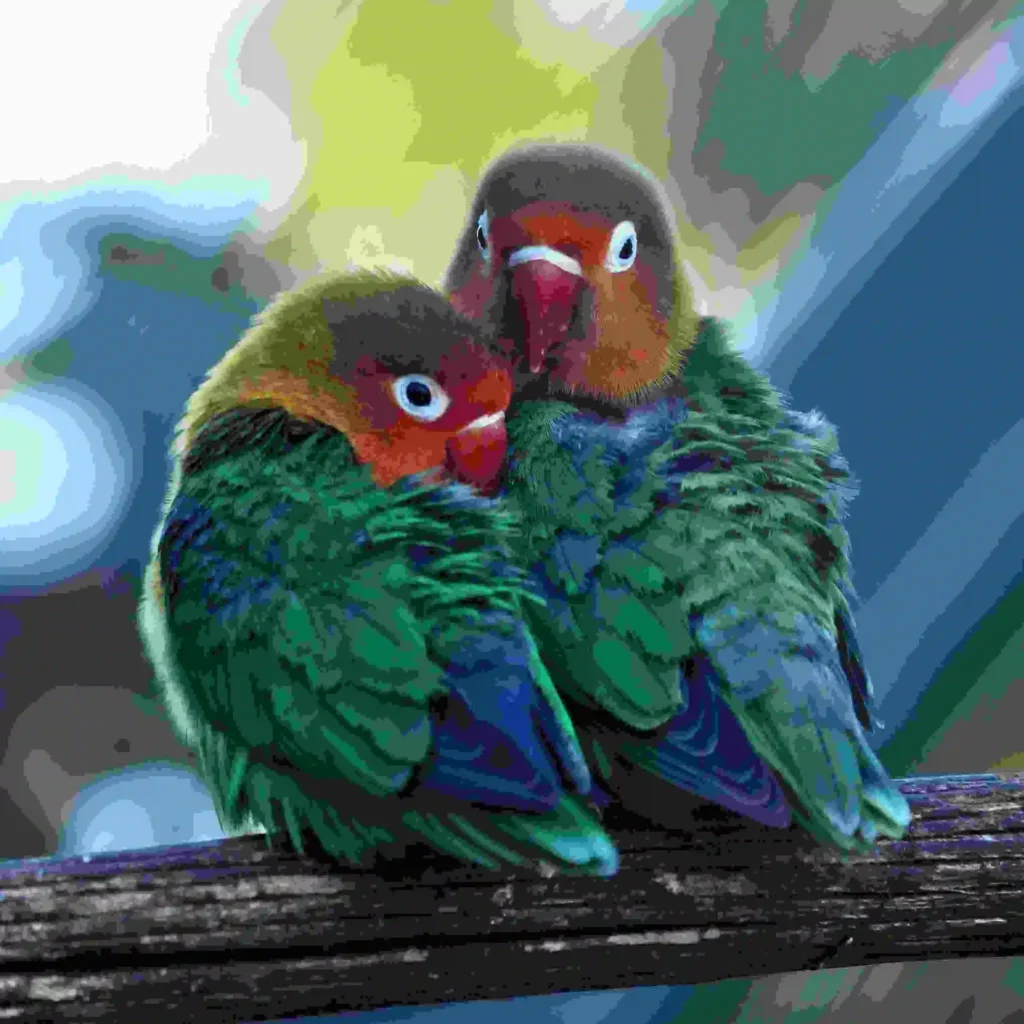
Overview: Small parrots (5-7 inches) with stocky builds and vibrant coloration. Named for their strong pair bonding in the wild.
Temperament: Energetic, playful, and sometimes mischievous. They can be territorial but form strong bonds with careful socialization.
Care Requirements:
- Cage size: Minimum 18″L x 18″W x 24″H
- Diet: High-quality seed mix, pellets, and fresh foods
- Enrichment: Chewable toys, puzzles, ladders, and daily out-of-cage time
Health Considerations: Watch for egg binding in females, obesity, and vitamin A deficiency.
Lifespan: 10-15 years
Noise Level: Moderate to occasionally loud; they have sharp calls when excited
Cost: $50-$150 depending on species; $200 for setup; $25 monthly maintenance
Pros: Colorful, entertaining, active, can become quite tame Cons: Can be nippy without proper socialization, may become one-person birds, need consistent handling
Parrotlets
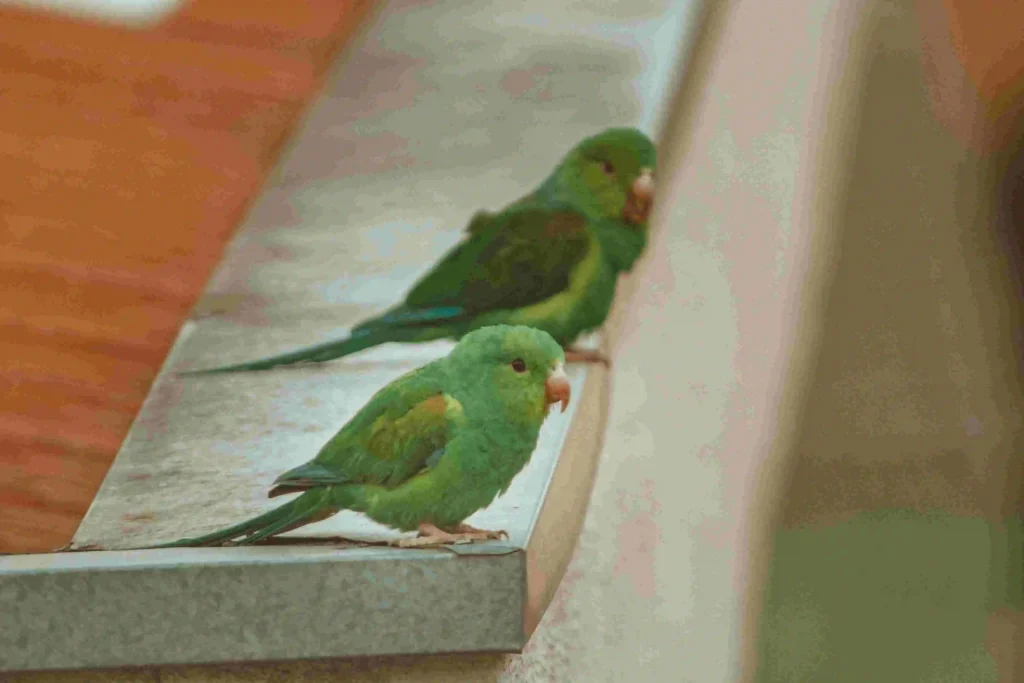
Overview: The smallest parrot species kept as pets (4-5 inches),
often called “pocket parrots” due to their tiny size but big personalities.
Temperament: Bold, confident, and surprisingly assertive for their size. They’re intelligent and curious.
Care Requirements:
- Cage size: Minimum 18″L x 18″W x 18″H with small bar spacing
- Diet: High-quality seed mix, pellets, and plenty of fresh foods
- Enrichment: Small toys, swings, ladders, and supervised play time
Health Considerations: Prone to fatty tumors and obesity; need regular exercise and a balanced diet.
Lifespan: 15-20 years
Noise Level: One of the quieter parrot species; chirp and chatter but rarely scream
Cost: $100-$250; $200 for setup; $25 monthly maintenance
Pros: Small size, relatively quiet, intelligent, trainable Cons: Can be territorial and nippy, require supervision with children, stronger bite than their size suggests
Best Low-Maintenance Pet Birds for Beginners
For those with limited time or experience, these birds offer companionship without demanding constant attention.
Finches
As mentioned earlier, finches are excellent low-maintenance options. They’re content with minimal human interaction, preferring the company of other finches instead.
Canaries
Similarly, canaries are independent birds that don’t require handling to thrive. Their beautiful songs provide enjoyment without the need for intensive care.
Doves

Overview: Medium to large birds (12-14 inches) with soft, rounded bodies and gentle dispositions. Ring-necked doves are most common as pets.
Temperament: Peaceful, calm, and undemanding. They have a soothing presence and gentle cooing.
Care Requirements:
- Cage size: Minimum 24″L x 24″W x 24″H with horizontal space for movement
- Diet: Dove seed mix, crushed oyster shell, and occasional greens
- Enrichment: Simple perches, bathing dishes, and nesting material
Health Considerations: Generally hardy; watch for parasites and obesity.
Lifespan: 12-15 years
Noise Level: Soft, pleasant cooing that’s rarely disruptive
Cost: $50-$100; $150-$200 for setup; $20 monthly maintenance
Pros: Gentle temperament, soothing sounds, relatively low maintenance Cons: Not as interactive as parrots, can be messy eaters, need more floor space than perching space
Essential Bird Care Tips for Beginners
Choosing the Right Cage
- Size: Always opt for the largest cage your space and budget allow. Birds need room to spread their wings and move.
- Bar Spacing: Smaller birds need narrower bar spacing to prevent escape or injury.
- Placement: Position the cage against a wall for security, away from drafts, direct sunlight, and kitchen fumes.
- Essentials: Include multiple perches of varying diameters, food and water dishes, and appropriate toys.
Diet and Nutrition
Birds require more than just seeds for optimal health:
- Base Diet: Species-appropriate seed mix or pellets (pelleted diets are generally more nutritionally complete)
- Fresh Foods: Offer a variety of vegetables and limited fruits daily
- Supplements: Cuttlebone or mineral blocks provide essential calcium
- Clean Water: Changed daily, with separate dishes for bathing
Enrichment and Toys
Mental stimulation is crucial for birds’ emotional health:
- Rotation System: Maintain 3-4 toys in the cage at once, rotating new ones in weekly
- Types of Toys: Include foraging toys, chewable items, swings, bells, and puzzle toys
- Natural Items: Untreated wood branches, safe plants, and leaves add enrichment
- Out-of-Cage Time: Provide supervised freedom in a bird-proofed room daily if appropriate for your species
Health and Hygiene
Preventative care saves lives and veterinary expenses:
- Finding a Vet: Locate an avian veterinarian before an emergency arises
- Regular Check-ups: Annual examinations help catch problems early
- Cage Cleaning: Weekly deep cleaning and daily spot cleaning
- Warning Signs: Watch for fluffed feathers, tail bobbing, lethargy, changes in droppings, or decreased appetite
American Resources for Bird Owners
The United States offers numerous resources for bird owners:
- Association of Avian Veterinarians: Find a qualified bird vet near you via www.aav.org
- Bird Rescues: Organizations like Mickaboo Companion Bird Rescue or Best Friends Animal Society often have birds available for adoption
- Legal Considerations: The Migratory Bird Treaty Act protects native bird species; ensure your pet bird was legally bred in captivity
- Local Availability: PetSmart, Petco, and independent pet stores typically carry budgies, cockatiels, and finches; specialty birds may require breeders
Dr. Sarah Johnson, an avian veterinarian from the University of California, Davis, notes: “Many first-time bird owners underestimate the importance of social interaction. Even species that don’t require handling still need environmental enrichment and observation to thrive.”
Conclusion
Choosing the best pet bird for beginners involves thoughtful consideration of your lifestyle, living situation, and expectations. Budgies, finches, and canaries make excellent apartment companions, while cockatiels and lovebirds offer more interactive experiences for families. For those seeking low-maintenance options, doves and finches provide beauty and gentle sounds without demanding excessive attention.
Remember that all birds, regardless of species, deserve proper housing, nutrition, enrichment, and veterinary care. Take time to research thoroughly before bringing home your feathered friend, and prepare for a relationship that could span decades with the right care.
Ready to take the next step in your bird ownership journey? Consider visiting local bird clubs or avian-specific expos where you can interact with different species and speak with experienced owners before making your final decision.
Have you kept any of these bird species? Share your experiences and tips in the comments below!
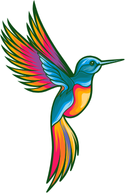
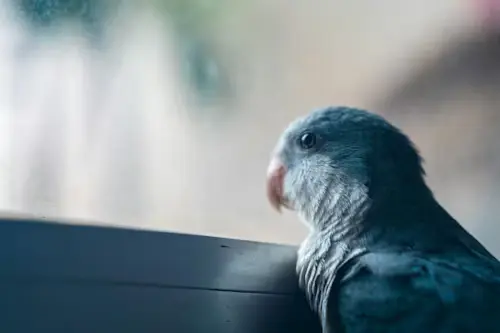
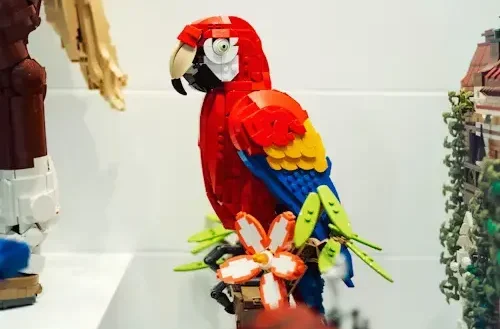
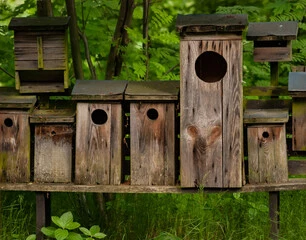
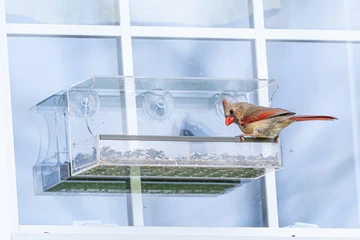
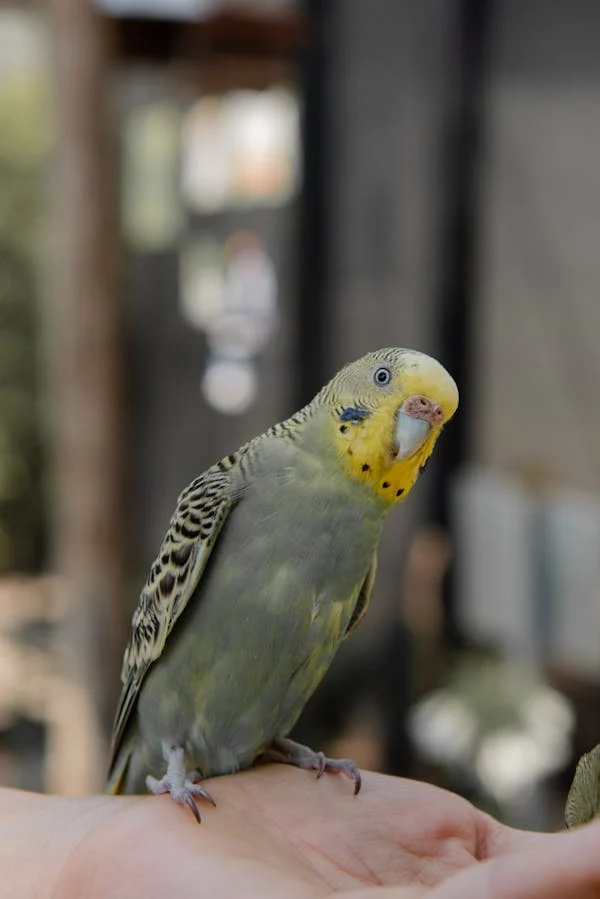
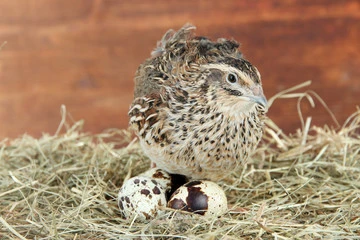
12 Comments